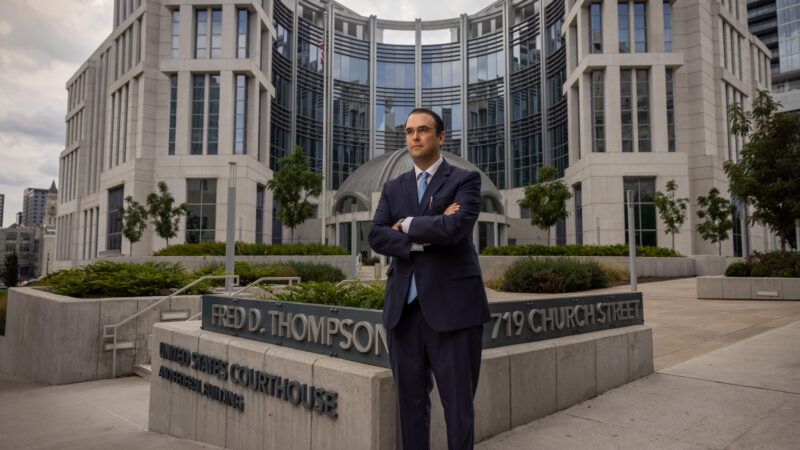Nashville Attorney Sues Federal Judges Over Gag Order Barring Him From Talking About a Notorious Prison
Daniel Horwitz often represents people illegally silenced by the government. This time he says a court violated his First Amendment rights when it gagged him from publicly speaking about a troubled state prison.

For the past two years, a Nashville attorney hasn't been able to publicly talk about a private prison company he's sued multiple times for civil rights abuses. Now that attorney has filed a First Amendment lawsuit against a federal court district and four federal judges, arguing that gag order violated his own civil rights.
Attorney Daniel Horwitz, represented by the Institute for Justice, a libertarian-leaning public interest law firm, filed a lawsuit against the U.S. District Court for the Middle District of Tennessee and four district court judges, arguing that the local rule used to gag him violates his First Amendment rights as-applied and is unconstitutional on its face.
Because of the gag order, Horwitz, says, he's been unable to publicly comment about deaths inside the prison. When the Department of Justice announced an investigation into conditions at the same facility this August, Horwitz had to turn down interview requests from media.
"Tweeting about and discussing my cases is a vital part of winning, not only in the courtroom, but with the public," Horwitz said in an Institute for Justice press release. "Seeking media attention not only helps my clients, but also raises awareness of unconstitutional practices being carried out by the government and its contractors. This helps educate both the public and lawmakers on the repercussions of unconstitutional laws."
In July of 2022, a federal magistrate judge issued a gag order against Horwitz barring him from making public comments in a wrongful death lawsuit he was pursuing against CoreCivic, a private prison company that operates the state's Trousdale Turner Correctional Center (TTCC). The judge also ordered Horwitz to delete dozens of past tweets about the company.
Horwitz is a prolific civil rights litigator in Tennessee. He has represented, among many others, a software company illogically targeted by the state cosmetology board, drug offenders serving mandatory minimum sentences that have been repealed, and a family who was terrorized by a drunk, off-duty NYPD officer who called them racial slurs and threatened to shoot them.
CoreCivic is one of Horwitz's most frequent courtroom opponents; he's represented plaintiffs in nine separate lawsuits against the company since 2020. Horwitz often tweeted about chronic understaffing and wrongful deaths at TTCC. In one tweet he wrote that "the degree of profit-motivated deliberate indifference—which is regularly killing people—is obscene at a level that even I find surprising."
CoreCivic argued in filings supporting a gag order that Horwitz's tweets were "extraordinarily vicious in their verbiage" and prejudicial, impacting the company's ability to receive a fair trial. In the case at issue, Horwitz was representing the family of Terry Childress, who was killed by a cellmate at TTCC.
Jeffery Frensley, a U.S. District Court magistrate judge, agreed, saying "trials are meant to occur in the courtroom, not the media." Frensley ruled that Horwitz's comments ran afoul of a court rule that presumes that public comments by attorneys on matters like the character of a party are prejudicial. CoreCivic settled that case several months later, but Horwitz argues the gag order has chilled his speech in his many subsequent cases against the company.
A spokesperson for CoreCivic says the company "stand[s] by the court's decision that supports our belief that matters of litigation should be decided within the court system and not in the press or social media."
It is rare to see attorneys sue the judges they have to regularly argue before—it's professionally advisable to maintain good relations with them. But despite multiple attempts to challenge the gag order and local rule, Horwitz was unable to get a final order on the merits because all of his lawsuits against CoreCivic settled first.
Horwitz's lawsuit says he filed it "only as a last resort because it has become apparent that, amidst his constant but short-lived lawsuits against the same government contractor, a standalone lawsuit is the only way to vindicate his right to speak."
"Mr. Horwitz needs to know the extent to which Rule 83.04 restricts his speech about his litigation in the Middle District because he continues to litigate in this Court, and he continues to do so against CoreCivic—a party that has already invoked Rule 83.04 to silence Mr. Horwitz's speech and has demonstrated that it will do so again each time Mr. Horwitz asserts his right to speak," his lawsuit argues.
Horwitz's suit argues that his speech has been substantially restricted over the past 26 months for fear of sanctions and having his clients' cases dismissed. For example, In August, the U.S. Justice Department announced an investigation into physical and sexual abuse at TTCC, citing many of the same reports of understaffing and violence that Horwitz relied on in his now-deleted tweets. But Horwitz said he has had to turn down interview requests from reporters about the prison and his cases.
"Speech critical of the government and the contractors that carry out government work is fundamental to the First Amendment and can help shed light on unlawful or unjust actions taken by the government," Institute for Justice attorney Jared McClain said in a press release. "The court cannot silence Daniel simply because he's criticizing a government contractor. Public interest litigation requires public discussion."


Show Comments (32)